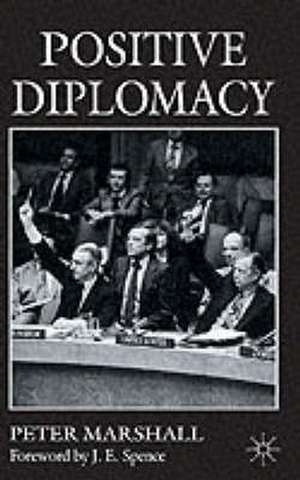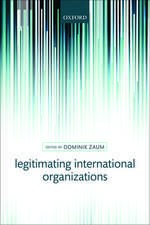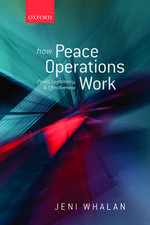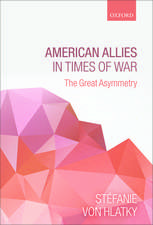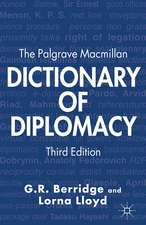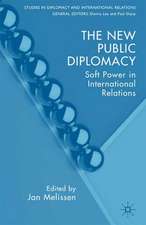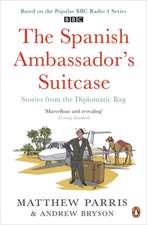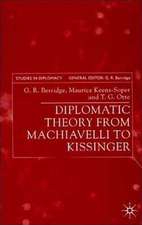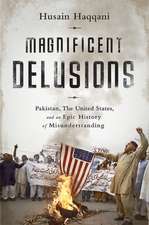Positive Diplomacy
Autor Sir Peter Marshallen Limba Engleză Paperback – 18 iun 1999
| Toate formatele și edițiile | Preț | Express |
|---|---|---|
| Paperback (2) | 326.92 lei 38-44 zile | |
| Palgrave Macmillan UK – 18 iun 1999 | 326.92 lei 38-44 zile | |
| Palgrave Macmillan UK – 1997 | 637.13 lei 6-8 săpt. | |
| Hardback (1) | 642.36 lei 6-8 săpt. | |
| Palgrave Macmillan UK – 25 iun 1997 | 642.36 lei 6-8 săpt. |
Preț: 326.92 lei
Nou
Puncte Express: 490
Preț estimativ în valută:
62.56€ • 65.08$ • 51.65£
62.56€ • 65.08$ • 51.65£
Carte tipărită la comandă
Livrare economică 11-17 aprilie
Preluare comenzi: 021 569.72.76
Specificații
ISBN-13: 9780333710982
ISBN-10: 0333710983
Pagini: 234
Ilustrații: XVIII, 234 p.
Dimensiuni: 140 x 216 x 14 mm
Greutate: 0.3 kg
Ediția:1999
Editura: Palgrave Macmillan UK
Colecția Palgrave Macmillan
Locul publicării:London, United Kingdom
ISBN-10: 0333710983
Pagini: 234
Ilustrații: XVIII, 234 p.
Dimensiuni: 140 x 216 x 14 mm
Greutate: 0.3 kg
Ediția:1999
Editura: Palgrave Macmillan UK
Colecția Palgrave Macmillan
Locul publicării:London, United Kingdom
Cuprins
Preface Foreword; J.E.Spence Introduction: Action as the End Object of Diplomacy The Evolution of Diplomacy in Response to Rapid Change and Growing Interdependence The Nature of International Society Today National Sovereignty and Its Limits The United Nations The World Economy European Architecture Foreign Policy-making Diplomatic Service Organisation The Acquisition of Diplomatic Skills: Drafting Advocacy and the Written Word A Diplomat's Decade Annexes Notes Bibliography Index
Recenzii
`Positive Diplomacy is far more than a manual of instruction: wit and elegance happily inform a superb analysis. Aspiring diplomats, current practitioners and their political masters and those who seek to understand international relations will read it with profit and pleasure.' - J. E. Spence, Associate Fellow and former Director of Studies, Royal Institute of International Affairs
`This excellent book . . . Earlier classics such as Nicolson's Diplomacy are now hopelessly out of date and new authoritative guidance to the subject was badly needed. Positive Diplomacy, which draws on a lifetime of diplomatic experience, fills the gap admirably.' - Margaret Doxey, International Journal of Canadian Institute of International Affairs
`Marshall's discussion of the place of the United Nations in international diplomacy is a characteristic mixture of common sense, penetrating insight and humour . . . the central message is serious: diplomacy can be a force for good, and has in some respects changed for the better in this century.' - Adam Roberts, The Times Literary Supplement
'Its great merit is that it combines a detailed exposition of the work of a diplomat with an explanation of how the world has changed and what is required for diplomatic theory and practice to accommodate successfully to these changes. Positive Diplomacy is far more than a manual of instruction: wit and elegance happily inform a superb analysis. Aspiring diplomats, current practitioners and their political masters and those who seek to understand international relations will read it with profit and pleasure.' - J.E. Spence, Associate Fellow and former Director of Studies, Royal Institute of International Affairs
'This excellent book...Earlier 'classics' such as Nicolson's Diplomacy are now hopelessly out of date and new authoritative guidance to the subject was badly needed. Positive Diplomacy, which draws on a lifetime of diplomatic experience, fills the gap admirably. It is written in elegant prose, combines scholarship with common sense and flashes of wit and can be warmly recommended not only to men and women entering the profession (and those already in it) but to a wider readership embracing those who seek a better understanding of the key role of diplomacy in the contemporary world.' - Margaret Doxey, International Journal of Canadian Institute of International Affairs
'Marshall's aim is simply to encourage 'a professional approach to the handling of international relations'... Marshall's discussion of the place of the United Nations in international diplomacy is a characteristic mixture of common sense, penetrating insight and humour...the central message is serious: diplomacy can be a force for good, and has in some respects changed for the better in this century. This approach is in the tradition of Harold Nicolson, whose book Diplomacy (1939) Peter Marshall reveres, and who did much to promote the idea that a regrettable old diplomacy is being supplanted by a better new one. Marshall's vision of the diplomat's role, with its emphasis on development and human rights, adds plausibility to his claim that the diplomatic profession may be becoming almost respectable.' - Adam Roberts, Times Literary Supplement
`This excellent book . . . Earlier classics such as Nicolson's Diplomacy are now hopelessly out of date and new authoritative guidance to the subject was badly needed. Positive Diplomacy, which draws on a lifetime of diplomatic experience, fills the gap admirably.' - Margaret Doxey, International Journal of Canadian Institute of International Affairs
`Marshall's discussion of the place of the United Nations in international diplomacy is a characteristic mixture of common sense, penetrating insight and humour . . . the central message is serious: diplomacy can be a force for good, and has in some respects changed for the better in this century.' - Adam Roberts, The Times Literary Supplement
'Its great merit is that it combines a detailed exposition of the work of a diplomat with an explanation of how the world has changed and what is required for diplomatic theory and practice to accommodate successfully to these changes. Positive Diplomacy is far more than a manual of instruction: wit and elegance happily inform a superb analysis. Aspiring diplomats, current practitioners and their political masters and those who seek to understand international relations will read it with profit and pleasure.' - J.E. Spence, Associate Fellow and former Director of Studies, Royal Institute of International Affairs
'This excellent book...Earlier 'classics' such as Nicolson's Diplomacy are now hopelessly out of date and new authoritative guidance to the subject was badly needed. Positive Diplomacy, which draws on a lifetime of diplomatic experience, fills the gap admirably. It is written in elegant prose, combines scholarship with common sense and flashes of wit and can be warmly recommended not only to men and women entering the profession (and those already in it) but to a wider readership embracing those who seek a better understanding of the key role of diplomacy in the contemporary world.' - Margaret Doxey, International Journal of Canadian Institute of International Affairs
'Marshall's aim is simply to encourage 'a professional approach to the handling of international relations'... Marshall's discussion of the place of the United Nations in international diplomacy is a characteristic mixture of common sense, penetrating insight and humour...the central message is serious: diplomacy can be a force for good, and has in some respects changed for the better in this century. This approach is in the tradition of Harold Nicolson, whose book Diplomacy (1939) Peter Marshall reveres, and who did much to promote the idea that a regrettable old diplomacy is being supplanted by a better new one. Marshall's vision of the diplomat's role, with its emphasis on development and human rights, adds plausibility to his claim that the diplomatic profession may be becoming almost respectable.' - Adam Roberts, Times Literary Supplement
Notă biografică
SIR PETER MARSHALL served as a Navigator in the RAF from 1943-46 before embarking on a career in the British Foreign Service from 1949-83 where he served in Washington, Baghdad, Bangkok, Geneva, Paris and New York. He was Commonwealth Deputy Secretary General (Economic) from 1983-88 and Chairman of the Royal Commonwealth Society and Commonwealth Trust from 1988-92. Since 1989, he has been Visiting Lecturer at the Diplomatic Academy of London at the University of Westminster. He is an Honorary Fellow of Corpus Christi College, Cambridge and the University of Westminster. He is the author of The Dynamics of Diplomacy.
